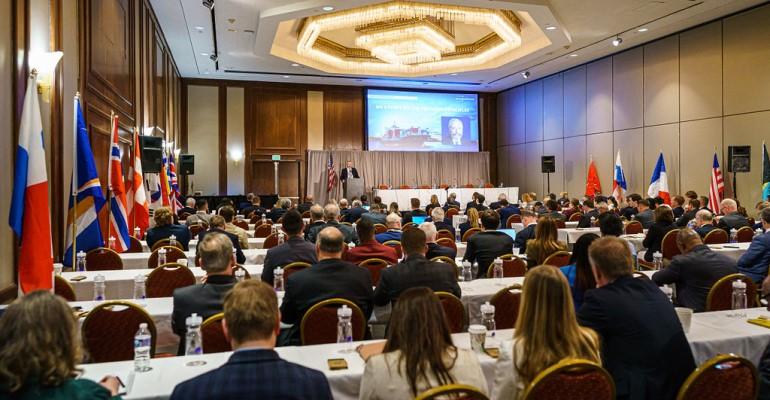Speaking on the opening day of CMA Shipping 2023 in Connecticut, Michael Parker, Chairman, Global Shipping, Logistics & Offshore at Citi and one of the architects of the Poseidon Principles, said that the ambitions and commitments within the framework would make for tough decisions in coming years.
“We will now have to make the difficult decisions about the business we do and who we do it with. Because in order to provide the capital, we need to provide it to the people who are taking a lead—in all industries, not just the shipping industry—in order for us to meet the commitment we've made to our regulators and our shareholders to decarbonise our portfolio by 2050 and to be measured, and to have to set targets between now and 2030 and 2040,” said Parker.
Parker recalled that at the inception of the Poseidon Principles, Euronav CEO Hugo de Stoop said that the framework needed carrots and sticks.
“I think in finance, in which I do include the capital markets here, the sticks and carrots are still too small. I think one of the things we'll start to see is those will get bigger,” said Parker.
In updating delegates on the progress of the Poseidon Principles, Parker covered the growth of the Global Maritime Forum’s initiatives to include cargo owners and insurers. He outlined the significant role finance can play in changing industries, but also stressed the importance of progress across the various industry stakeholders, including regulators. “MEPC 80 is a very key meeting. If the IMO does not raise its ambition, then we will have problems because we will not be decarbonising fast enough to have any hope of meeting the Paris goal of 1.5 [degrees of warming],” said Parker.
“The great concern is if it doesn't have that increased ambition, there will be a serious problem for the IMO, primarily because the private sector isn't going to wait for the regulators,” said Parker, giving the examples of green corridors, coZEV alliance and Zero Emissions Buyers Alliance as evidence of industry moving ahead of regulators.
Increased scrutiny of finance portfolios is only set to rise as shipping plays a role in the emissions performance of the industries it carries goods for.
“All the decisions we make, not just in our shipping business but in all our businesses, are being scrutinised by bank regulators. That will have a huge influence on where we direct capital, and who we do business with. That's very important for everyone to understand, this is a global issue and it is an issue where finance will be the primary driver of the speed of how this happens, ultimately. Governments are really putting in effort through how they regulate banks, so I'm expecting to see capital directed to the right initiatives,” said Parker.
Summarising his update on the Poseidon Principles, parker said: “We've set [The Poseidon Principles] up, we're now in our fourth year, and now it is going to get difficult, and we all know that if we're going to do the right thing for the environment, this industry has to do its bit, and banks, insurers, cargo owners, everyone is doing their bit.”
Copyright © 2024. All rights reserved. Seatrade, a trading name of Informa Markets (UK) Limited.
Add Seatrade Maritime News to your Google News feed.  |

